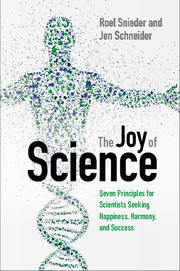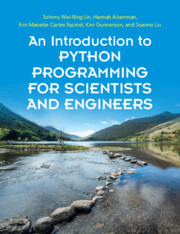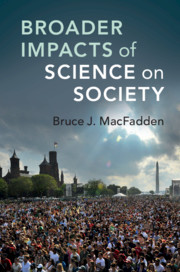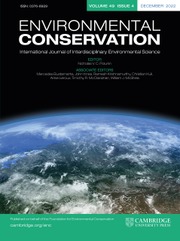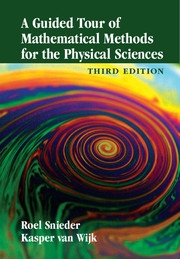The Joy of Science
Seven Principles for Scientists Seeking Happiness, Harmony, and Success
- Authors:
- Roel Snieder, Colorado School of Mines
- Jen Schneider, Boise State University, Idaho
- Date Published: July 2016
- availability: Available
- format: Paperback
- isbn: 9781316509005
Paperback
-
We live in an age where working in science or engineering offers tremendous professional opportunities - the pace of scientific development is truly breathtaking. Yet many researchers struggle with the pressures of the fast-paced academic workplace, and struggle to harmonize their work and personal lives. The result can be burnout, exhaustion, and stress on a personal level, and difficulty in recruiting and retaining talented, diverse people to science and engineering. This book, written for graduate students and researchers at all stages of their careers, aims to help scientists by identifying and questioning the core beliefs that drive a culture of overwork, and provides real-world examples and exercises for those wishing to do things differently. Written in a lively narrative style, and including interview excerpts from practicing scientists, social scientists, and engineers, this book serves as a guide for those seeking to practice the seven traits of the joyful scientist.
Read more- Makes the reader aware of the personal and collective beliefs about what it means to be a successful scientist
- Offers practical suggestions and ideas for leading a balanced life while thriving in a scientific career
- Offers anecdotes from scientists that illustrate and deepen the material covered
- Exercises invite the reader to reflect and explore alternative approaches to living the life of a scientist
Reviews & endorsements
'In these times where scientists are under increasing pressure to prove their worth through metrics, this welcome book provides a refreshing perspective into how we might all find personal satisfaction and joy in playing the game of science.' Julie Smith, Radford College, Canberra and Malcolm Sambridge, Australian National University, Canberra
See more reviews'This book stands out from the sea of recipes for work-life balance and time management, in that it distills joy as a core trait for 'success'. Although it may seem at odds with the objective scientific method and the image of detached, humorless scientists, the authors make a fascinating case for personal touch, passion, and subjective imprint as core assets for creative, ground-breaking progress and improved personal lives. The book is informative and captivating, but most importantly, it is timely in an age where performance pressures surge to the detriment of progress, and academics find themselves with little time to do research.' Tarje Nissen-Meyer, University of Oxford
'Too many scientists fall into the trap of overworking and burning out at great cost to their careers and personal lives. In The Joy of Science, Roel Snieder and Jen Schneider present a highly readable discussion of the challenges scientists face, and provide personal stories, thought-provoking questions, and practical recommendations relevant to both young and more senior scientists. They remind us that we are human and help us keep our eye on the ball, of a joyful and fulfilling life.' Richard Primack, Boston University and Editor-in-Chief, Biological Conservation
'In The Joy of Science, emotional intelligence takes its rightful place alongside intellectual intelligence. A perfect read for the scientist, academic or engineer seeking a more fulfilling and successful life. [It] will be at the top of my client reading list.' Eileen Flanigan, MBA Process Engineer, author and life coach
'This is not a book aimed at describing the qualities that lead to good research. Nor does The Joy of Science discuss ways to deal with problems by improving the system … Instead, in each chapter Snieder and Schneider give examples of scientists in pressure-induced, dysfunctional situations and suggest behavioral changes that could help alleviate the problem … One of the book's most important points, which wasn't emphasized enough in my view, is that students, postdocs, and faculty feeling under the gun often think that they are alone and that others who usually put up a good front don't feel such pressures. The Joy of Science can convince scientists under stress that they are not alone, and thus it can immediately begin to achieve its goal.' Gordon Kane, Physics Today
Customer reviews
17th Oct 2024 by UName-465400
Excellent book. I loved it. Normally, we scientist try to avoid the terms like compassion, kindness etc. Professor Roel Snieder and Jen Schneider did wonderful work for science. I appreciate the effort. It is good contribution. Altogether a new look.
Review was not posted due to profanity
×Product details
- Date Published: July 2016
- format: Paperback
- isbn: 9781316509005
- length: 180 pages
- dimensions: 228 x 152 x 9 mm
- weight: 0.31kg
- contains: 34 b/w illus.
- availability: Available
Table of Contents
Preface
Introduction
1. Harmony
2. Courage
3. Vision
4. Curiosity
5. Listening
6. Compassion
7. Integrity
References.
Sorry, this resource is locked
Please register or sign in to request access. If you are having problems accessing these resources please email [email protected]
Register Sign in» Proceed
You are now leaving the Cambridge University Press website. Your eBook purchase and download will be completed by our partner www.ebooks.com. Please see the permission section of the www.ebooks.com catalogue page for details of the print & copy limits on our eBooks.
Continue ×Are you sure you want to delete your account?
This cannot be undone.
Thank you for your feedback which will help us improve our service.
If you requested a response, we will make sure to get back to you shortly.
×
